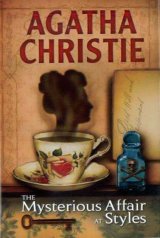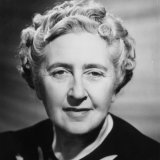The Mysterious Affair at Styles Page #6
The Mysterious Affair at Styles is a detective novel by British writer Agatha Christie. It was written in the middle of the First World War, in 1916, and first published by John Lane in the United States in October 1920 and in the United Kingdom by The Bodley Head on 21 January 1921.
Cynthia and I went and sat by the open window in the drawing-room. Mary Cavendish brought our coffee to us. She seemed excited. “Do you young people want lights, or do you enjoy the twilight?” she asked. “Will you take Mrs. Inglethorp her coffee, Cynthia? I will pour it out.” “Do not trouble, Mary,” said Inglethorp. “I will take it to Emily.” He poured it out, and went out of the room carrying it carefully. Lawrence followed him, and Mrs. Cavendish sat down by us. We three sat for some time in silence. It was a glorious night, hot and still. Mrs. Cavendish fanned herself gently with a palm leaf. “It’s almost too hot,” she murmured. “We shall have a thunderstorm.” Alas, that these harmonious moments can never endure! My paradise was rudely shattered by the sound of a well known, and heartily disliked, voice in the hall. “Dr. Bauerstein!” exclaimed Cynthia. “What a funny time to come.” I glanced jealously at Mary Cavendish, but she seemed quite undisturbed, the delicate pallor of her cheeks did not vary. In a few moments, Alfred Inglethorp had ushered the doctor in, the latter laughing, and protesting that he was in no fit state for a drawing-room. In truth, he presented a sorry spectacle, being literally plastered with mud. “What have you been doing, doctor?” cried Mrs. Cavendish. “I must make my apologies,” said the doctor. “I did not really mean to come in, but Mr. Inglethorp insisted.” “Well, Bauerstein, you are in a plight,” said John, strolling in from the hall. “Have some coffee, and tell us what you have been up to.” “Thank you, I will.” He laughed rather ruefully, as he described how he had discovered a very rare species of fern in an inaccessible place, and in his efforts to obtain it had lost his footing, and slipped ignominiously into a neighbouring pond. “The sun soon dried me off,” he added, “but I’m afraid my appearance is very disreputable.” At this juncture, Mrs. Inglethorp called to Cynthia from the hall, and the girl ran out. “Just carry up my despatch-case, will you, dear? I’m going to bed.” The door into the hall was a wide one. I had risen when Cynthia did, John was close by me. There were therefore three witnesses who could swear that Mrs. Inglethorp was carrying her coffee, as yet untasted, in her hand. My evening was utterly and entirely spoilt by the presence of Dr. Bauerstein. It seemed to me the man would never go. He rose at last, however, and I breathed a sigh of relief. “I’ll walk down to the village with you,” said Mr. Inglethorp. “I must see our agent over those estate accounts.” He turned to John. “No one need sit up. I will take the latch-key.” CHAPTER III. THE NIGHT OF THE TRAGEDY To make this part of my story clear, I append the following plan of the first floor of Styles. The servants’ rooms are reached through the door B. They have no communication with the right wing, where the Inglethorps’ rooms were situated. 01 It seemed to be the middle of the night when I was awakened by Lawrence Cavendish. He had a candle in his hand, and the agitation of his face told me at once that something was seriously wrong. “What’s the matter?” I asked, sitting up in bed, and trying to collect my scattered thoughts. “We are afraid my mother is very ill. She seems to be having some kind of fit. Unfortunately she has locked herself in.” “I’ll come at once.” I sprang out of bed; and, pulling on a dressing-gown, followed Lawrence along the passage and the gallery to the right wing of the house. John Cavendish joined us, and one or two of the servants were standing round in a state of awe-stricken excitement. Lawrence turned to his brother. “What do you think we had better do?” Never, I thought, had his indecision of character been more apparent. John rattled the handle of Mrs. Inglethorp’s door violently, but with no effect. It was obviously locked or bolted on the inside. The whole household was aroused by now. The most alarming sounds were audible from the interior of the room. Clearly something must be done. “Try going through Mr. Inglethorp’s room, sir,” cried Dorcas. “Oh, the poor mistress!” Suddenly I realized that Alfred Inglethorp was not with us—that he alone had given no sign of his presence. John opened the door of his room. It was pitch dark, but Lawrence was following with the candle, and by its feeble light we saw that the bed had not been slept in, and that there was no sign of the room having been occupied. We went straight to the connecting door. That, too, was locked or bolted on the inside. What was to be done? “Oh, dear, sir,” cried Dorcas, wringing her hands, “what ever shall we do?” “We must try and break the door in, I suppose. It’ll be a tough job, though. Here, let one of the maids go down and wake Baily and tell him to go for Dr. Wilkins at once. Now then, we’ll have a try at the door. Half a moment, though, isn’t there a door into Miss Cynthia’s rooms?” “Yes, sir, but that’s always bolted. It’s never been undone.” “Well, we might just see.” He ran rapidly down the corridor to Cynthia’s room. Mary Cavendish was there, shaking the girl—who must have been an unusually sound sleeper—and trying to wake her. In a moment or two he was back. “No good. That’s bolted too. We must break in the door. I think this one is a shade less solid than the one in the passage.” We strained and heaved together. The framework of the door was solid, and for a long time it resisted our efforts, but at last we felt it give beneath our weight, and finally, with a resounding crash, it was burst open. We stumbled in together, Lawrence still holding his candle. Mrs. Inglethorp was lying on the bed, her whole form agitated by violent convulsions, in one of which she must have overturned the table beside her. As we entered, however, her limbs relaxed, and she fell back upon the pillows. John strode across the room, and lit the gas. Turning to Annie, one of the housemaids, he sent her downstairs to the dining-room for brandy. Then he went across to his mother whilst I unbolted the door that gave on the corridor. I turned to Lawrence, to suggest that I had better leave them now that there was no further need of my services, but the words were frozen on my lips. Never have I seen such a ghastly look on any man’s face. He was white as chalk, the candle he held in his shaking hand was sputtering onto the carpet, and his eyes, petrified with terror, or some such kindred emotion, stared fixedly over my head at a point on the further wall. It was as though he had seen something that turned him to stone. I instinctively followed the direction of his eyes, but I could see nothing unusual. The still feebly flickering ashes in the grate, and the row of prim ornaments on the mantelpiece, were surely harmless enough. The violence of Mrs. Inglethorp’s attack seemed to be passing. She was able to speak in short gasps. “Better now—very sudden—stupid of me—to lock myself in.” A shadow fell on the bed and, looking up, I saw Mary Cavendish standing near the door with her arm around Cynthia. She seemed to be supporting the girl, who looked utterly dazed and unlike herself. Her face was heavily flushed, and she yawned repeatedly.
Translation
Translate and read this book in other languages:
Select another language:
- - Select -
- 简体中文 (Chinese - Simplified)
- 繁體中文 (Chinese - Traditional)
- Español (Spanish)
- Esperanto (Esperanto)
- 日本語 (Japanese)
- Português (Portuguese)
- Deutsch (German)
- العربية (Arabic)
- Français (French)
- Русский (Russian)
- ಕನ್ನಡ (Kannada)
- 한국어 (Korean)
- עברית (Hebrew)
- Gaeilge (Irish)
- Українська (Ukrainian)
- اردو (Urdu)
- Magyar (Hungarian)
- मानक हिन्दी (Hindi)
- Indonesia (Indonesian)
- Italiano (Italian)
- தமிழ் (Tamil)
- Türkçe (Turkish)
- తెలుగు (Telugu)
- ภาษาไทย (Thai)
- Tiếng Việt (Vietnamese)
- Čeština (Czech)
- Polski (Polish)
- Bahasa Indonesia (Indonesian)
- Românește (Romanian)
- Nederlands (Dutch)
- Ελληνικά (Greek)
- Latinum (Latin)
- Svenska (Swedish)
- Dansk (Danish)
- Suomi (Finnish)
- فارسی (Persian)
- ייִדיש (Yiddish)
- հայերեն (Armenian)
- Norsk (Norwegian)
- English (English)
Citation
Use the citation below to add this book to your bibliography:
Style:MLAChicagoAPA
"The Mysterious Affair at Styles Books." Literature.com. STANDS4 LLC, 2025. Web. 31 Jan. 2025. <https://www.literature.com/book/the_mysterious_affair_at_styles_309>.








Discuss this The Mysterious Affair at Styles book with the community:
Report Comment
We're doing our best to make sure our content is useful, accurate and safe.
If by any chance you spot an inappropriate comment while navigating through our website please use this form to let us know, and we'll take care of it shortly.
Attachment
You need to be logged in to favorite.
Log In